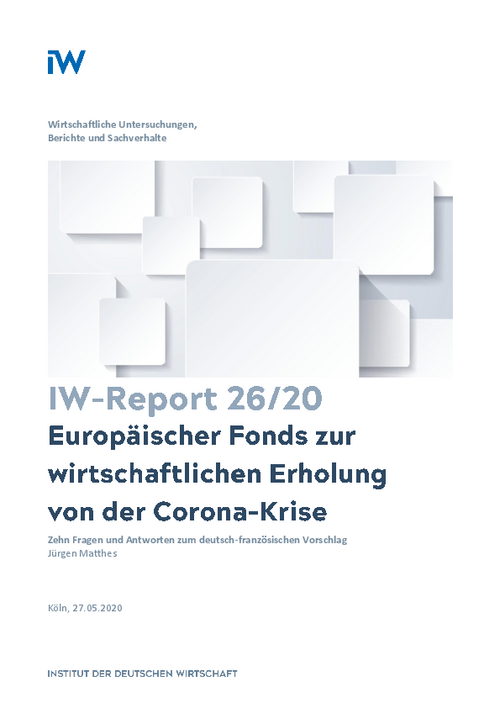Germany and France have proposed a European Recovery Fund of € 500 bn based on large loans taken out by the EU to be transferred exclusively as grants to EU member states particularly affected by the corona crisis. The legal construction still has to be sufficiently clarified and, due to the resistance of some EU countries (Frugal Four), implementation in the proposed form does not appear certain.

European fund for economic recovery from the Corona crisis: Ten questions and answers on the Franco-German proposal
IW-Report

Germany and France have proposed a European Recovery Fund of € 500 bn based on large loans taken out by the EU to be transferred exclusively as grants to EU member states particularly affected by the corona crisis. The legal construction still has to be sufficiently clarified and, due to the resistance of some EU countries (Frugal Four), implementation in the proposed form does not appear certain.
The Franco-German proposal places a heavy burden on future EU budgets. Even with a 20-year redemption phase after 2025, with an inflation rate of between 1 and 1.8 per cent per year, the redemption (including low interest payments) would initially take up between 14 and 12 per cent of the current annual EU budget. With a 10-year redemption period after 2025, this share would amount to between 30 and 27 per cent. The question of how these funds are to be raised in the future is being postponed to the future in a problematic way.
Thus, the question arises whether, instead of transfers, very low-interest loans would not also be adequate, as the Frugal Four demand. This demand is usually countered by the argument that loans would endanger debt sustainability in certain member states. This claim is currently hardly ever questioned. However, an analysis of Italy's debt sustainability shows: With low interest rates already for a longer period and probably also in the medium term, higher public debt level has only a very limited impact on debt sustainability. Even if Italy's public debt, for example, were to rise from 135 to 170 per cent of GDP, the Italian fiscal deficit (primary balance) would only have to be improved by 0.14 percentage points of GDP (to just under 0.7 per cent of GDP) to keep the public debt ratio constant. This applies if Italy's economy grows in real terms by only 0.7 per cent on average over the medium term and inflation is only 1.3 per cent – i.e. under not particularly optimistic assumptions. Low-interest EU loans are therefore not as damaging as is often assumed.
It is true that the Franco-German fund is intended only as a temporary instrument. However, some statements from government circles and the European Commission suggest that the Corona crisis should be used as an opportunity to significantly deepen fiscal integration in the EU and give the European Commission more financial resources and powers. However, greater fiscal integration requires an in-depth debate and should not be introduced by the back door. This is especially true since, given the necessary urgency, it does not seem guaranteed that liability and control would be increased in parallel, as would be required. To put it bluntly: If European fiscal integration were to be increased significantly by using the corona crisis, the necessary control standards are likely to be too weak, but new instruments could nevertheless become permanent. Therefore, the European Recovery Fund should definitely be time-limited and only a one-off exception.
If the EU is allowed to raise debts to finance transfers, policy makers in the future will be tempted to finance the redemption with new EU debts. Therefore, in order to prevent a permanent debt-raising capacity, a rollover of the EU loans should be clearly ruled out from the outset and a binding redemption plan should be laid down by law.

Jürgen Matthes: Europäischer Fonds zur wirtschaftlichen Erholung von der Corona-Krise – Zehn Fragen und Antworten zum deutsch-französischen Vorschlag
IW-Report

More on the topic
![[Translate to English:] Das Gebäude des Weißen Hauses in Washington, D.C. in den Vereinigten Staaten von Amerika. [Translate to English:] Das Gebäude des Weißen Hauses in Washington, D.C. in den Vereinigten Staaten von Amerika.](/fileadmin/_processed_/c/1/csm_GettyImages-2161499385_White_House_Editorial_884306add8.jpg)
Trump or Harris or ...? What Europe must prepare for
A few months before the presidential election in the USA, Donald Trump has a good chance of being re-elected. On the Democratic side, the incumbent president has withdrawn his candidacy after a long period of hesitation, while Vice President Kamala Harris is ...
IW
Compendium 5.5: CO2 Regulation of Road Transport in Europe
With the Compendium CO2 Regulation in Europe, the IW has been providing the interested public with a comprehensive collection of data on the development of CO2 emissions from passenger car traffic in the European Union, as well as on the applicable regulatory ...
IW